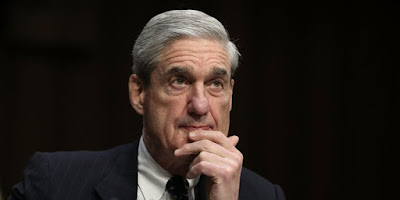When (now former) Special Counsel Robert Mueller went before the cameras to issue what he hopes will be his only statement on his report to Attorney General William Barr, he summarized his investigation into Russian "collusion" thus:
We conducted an independent criminal investigation and reported the results to the Attorney General — as required by Department regulations.
As Mueller further stated, that was all he ever intended to do, based on the presumption that Department of Justice policy precludes indicting a sitting US President:
It explains that under long-standing Department policy, a President cannot be charged with a federal crime while he is in office. That is unconstitutional. Even if the charge is kept under seal and hidden from public view — that too is prohibited.The Special Counsel’s Office is part of the Department of Justice and, by regulation, it was bound by that Department policy. Charging the President with a crime was therefore not an option we could consider.
Mueller investigated as he was asked to do. Mueller reported as he was required to do. And Mueller's position now is that his report is everything he has to say about his investigation.
The report is my testimony. I would not provide information beyond that which is already public in any appearance before Congress.
Whether Mueller truly has no information to provide beyond the report is problematic. As I have noted before, Mueller's handling of the case against Lt. General Michael Flynn is riddled with controversy and questions not only of legality but of basic fairness. Nor has Mueller provided any information or insight into whatever appraisal he made of the FBI activities that preceded his appointment as Special Counsel, and which formed the basis for his investigation, activities that raise their own questions of legality and propriety.
Yet while Mueller's statement was curiously short of clarity on these important points both of fact and law, his statement does make one thing absolutely clear: The Democrats must now formally impeach President Donald Trump.
Yes, I am saying the Democrats now have a duty to impeach the President.
To understand why I say this, let us remember the Constitution, in Article 1, Section 2, Clause 5, explicitly gives the House of Representatives "sole power of Impeachment". Only the House of Representatives may impeach. That is the Constitutional order.
Moreover, impeachment is what Mueller meant when he said "...the Constitution requires a process other than the criminal justice system to formally accuse a sitting President of wrongdoing." The Constitution actually does more than just require such a process, it spells out what that process is: The House impeaches, the Senate conducts the impeachment trial (Article 1, Section 3, Clauses 6 and 7), and the impeachment of the President shall be for "...Treason, Bribery, or other high Crimes and Misdemeanors" (Article 2 Section 4).
Mueller, however, pointed out a crucial aspect of our system of justice: "It would be unfair to potentially accuse somebody of a crime when there can be no court resolution of an actual charge."
The Democrats have done exactly that: Speaker of the House Nancy Pelosi has done so publicly (emphasis added):
We do believe that it is important to follow the facts, we believe that no one is above the law, including the president of the United States, and we believe the president of the United States is engaged in a cover-up, in a cover-up.
If Democrats believe this to be true, then they have a duty both to the Constitution and to the American people to begin impeachment proceedings. If the Democrats believe the Mueller Report contains evidences the President obstructed Justice, they have both the legal and moral duty to make their case formally, by voting articles of impeachment and having the Senate adjudicate them in an impeachment trial. They have the legal and moral obligation to follow through on their accusations, and to do so in a forum where President Trump may defend himself against those accusations, and where there may be an actual resolution of those accusations.
Unlike Mueller, I can be clear on one point: Having read his report, I do not see a case for either collusion or obstruction against President Trump. As I stated when Mueller submitted his report to the Attorney General, Mueller's investigation ended as it began: no facts, no evidence, no case. That has been my admittedly layman's opinion, and that opinion has not changed.
Still, I also agree with Mueller's expert opinion on the matter of fairness. If the Democrats are going to accuse the President, the President deserves a chance to defend himself and he deserves an opportunity to have the accusations properly adjudicated. If the Democrats believe Donald Trump has committed high crimes and misdemeanors, the Constitution and simple justice demand they impeach him. If the Democrats are unwilling to impeach, simple justice demands they speak no more of Russian collusion or obstruction, and turn their attentions at last to the business of governing the country.
Impeach. Or move on. Do. Or do not. There is no third choice for the Democrats. That is the one thing Mueller's statement has made abundantly clear.





